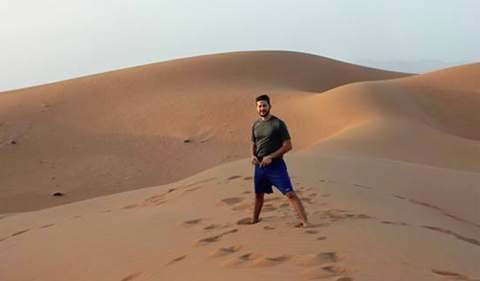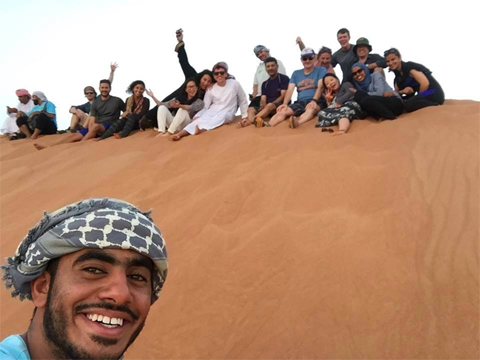By Nicole Rodriguez
Jamie Moriarty ’15 has always been interested in the Arabic language and culture. Over the summer, he took the initiative to travel to Muscat, Oman, to immerse himself in the language, make new friends, and broaden his cultural horizons.
“I always wanted to study Arabic and never had the means to … until I came [to Ohio University,]” says Moriarty. “My dad is a theologian, so I grew up with a lot of Arabic speakers. I always wanted to speak it with them. It just interested me. That interest sparked my understanding for how language and culture are intertwined and how beautiful it is.”
Not only did Moriarty throw himself into a foreign language, country, and culture, but he did so without the safety net of knowing anyone else on the trip.
“Don’t feel like you have to go somewhere that you know someone else from your university is going to,” he advises. “Go where you want to go because you’ll make friends instantly there. Confront that fear because that opens up realistic understandings of yourself.”
Why Oman?
Moriarty is involved in the Arabic Language Student Association, which not only helps first year students learn Arabic, but also does activities with the Omani Students Association. “I’ve been able to get to know a lot of Omanis around Athens, and it partially influenced my decision to go there,” says Moriarty, who minored in Linguistics and majored in Criminal Justice. The adjacent ocean didn’t seem to hurt either. “I was right on the coast, so that mixed with studying Arabic was the dream decision.”
Arabic Immersion
Moriarty spent a month in Muscat, studying Arabic for six hours every day .
“It was pretty exhausting,” he admits. Participants in his program ranged from fluent speakers to students who were just starting out. Moriarty took a placement test and landed in the intermediate level. While he was able to self-assess his need to move up or down a class, he still found the experience challenging, and certainly different from any Arabic class he’s taken at OHIO.
“Here, more than half of the class time is English,” he says. During his classes in Oman, he recalls hearing maybe three or four words of English a day. “It was humbling. Anything I thought I knew of myself and Arabic I had to reevaluate.”
Many students take on academic challenges like this for an accelerated course or to get ahead on foreign language credit, but not Moriarty.
“I didn’t need it for credit,” he says. “I wanted the experience.”
It’s a move that makes sense for a linguistics minor such as himself, and it will likely benefit him in his future endeavors. “If I were to attend graduate school, I would hope to [focus on] sociolinguistics of the Arabic language,” Moriarty says. He is in the process of applying for a Fulbright scholarship, and he hopes to teach English as a foreign language in Bahrain.
Food and Friendship
Moriarty was welcomed warmly to Oman by his classmates and had the opportunity to forge lasting friendships with them. “We had conversation partners, and I started to play a lot of football with them,” he said. “It was fun getting to know Omanis and hang out with them outside of the classroom.”
“I felt so taken care of one of the days with my conversation partner Mohammed,” he recalls. “After class he came by and picked me up from the school, and we went to get food. In Omani culture, if you’re with an Omani they’ll pay for you, so he insisted on getting me whatever I wanted… and then we went to the beach and played football. Then his other friend that I had only met once took me home and we stopped at a food place, and he also insisted on getting me food, so I had two mango juices that day…. That’s one thing I learned, that I really like mango juice.”
Mango juice wasn’t the only exotic thing Moriarty got to try in Oman.
“It’s either chicken, fish, or ‘meat,’” he explains. Apparently this mystery meat is camel, which Moriarty ended up trying by surprise. “I tried camel for the first time, and that was weird. I’m not gonna say it wasn’t good, but I definitely was a little bummed when I found out what I was eating was camel.”
Broadening Horizons
Moriarty’s experiences in the Middle East have undoubtedly made him acutely aware of the cultural lens through which he sees the world, and he makes that clear when recalling the biggest challenges he faced while adjusting to a new culture.
“Obviously I know what goes into having to adjust to a conservative Muslim community,” he prefaces. “From an American perspective, the inequalities—what I would observe as inequalities—were difficult to observe. For instance, we went night swimming once, and we had to drive 30 minutes longer to an ex-pat beach where the women would be allowed to swim…. It was something that I didn’t have to agree with, but it was something I had to respect.” This is a notion that he feels that anyone can become more in tune with. “We need to look at our culture as something relative, not absolute.”





















Comments